Tourism Development Report
VerifiedAdded on 2019/12/03
|7
|1744
|253
Report
AI Summary
This report critically evaluates theories of tourism development, focusing on the dependency theory's explanation of the relationship between first and third-world countries. It examines how imperialism and unequal competition have hindered third-world development. The report also explores the interdependence between first and third-world economies, highlighting how developed nations benefit from resources from developing nations. Furthermore, the report discusses the impact of economic factors like recession and inflation, demographic structures, and political forces such as government policies and privatization on tourism development in various destinations. The conclusion emphasizes the importance of understanding these factors for sustainable tourism growth in third-world economies.
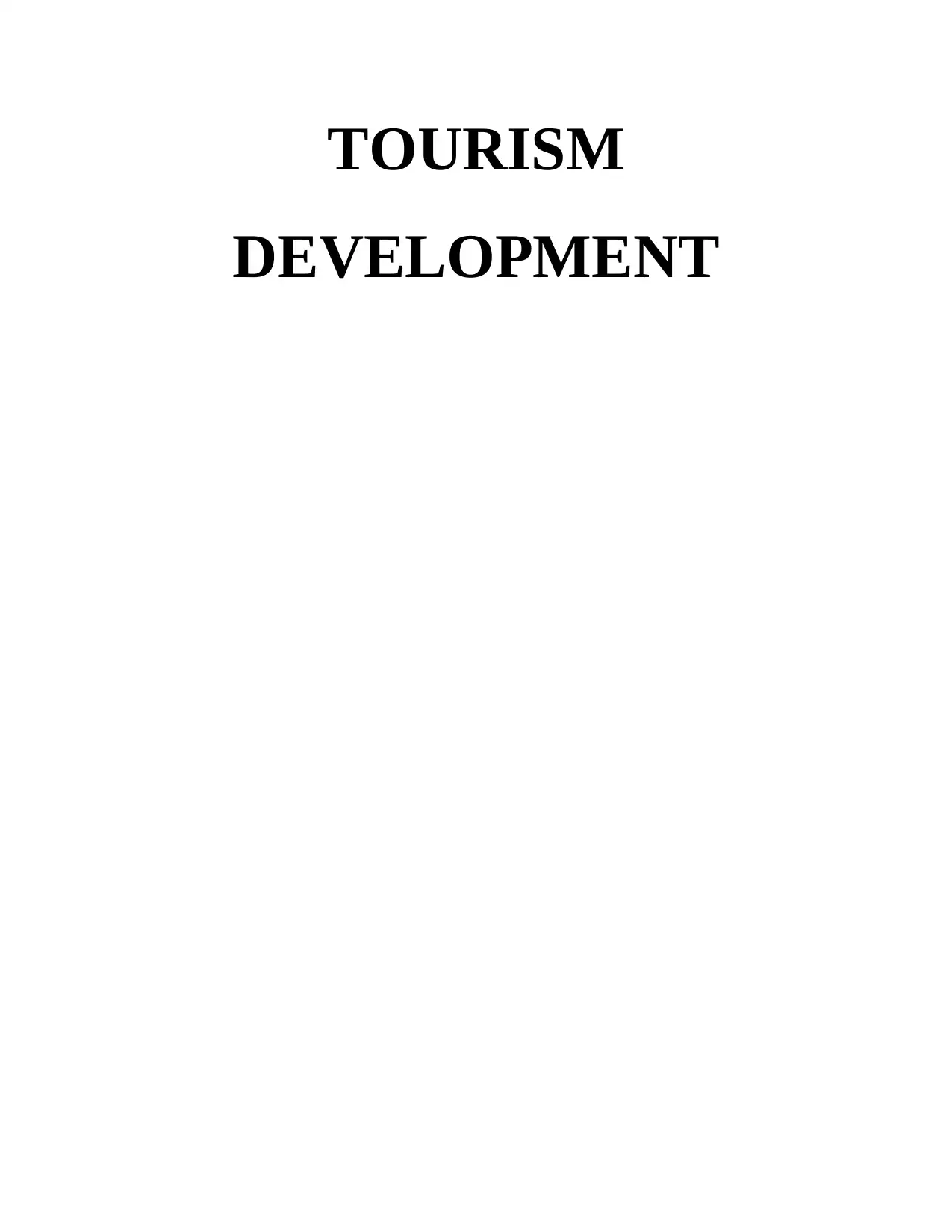
TOURISM
DEVELOPMENT
DEVELOPMENT
Paraphrase This Document
Need a fresh take? Get an instant paraphrase of this document with our AI Paraphraser
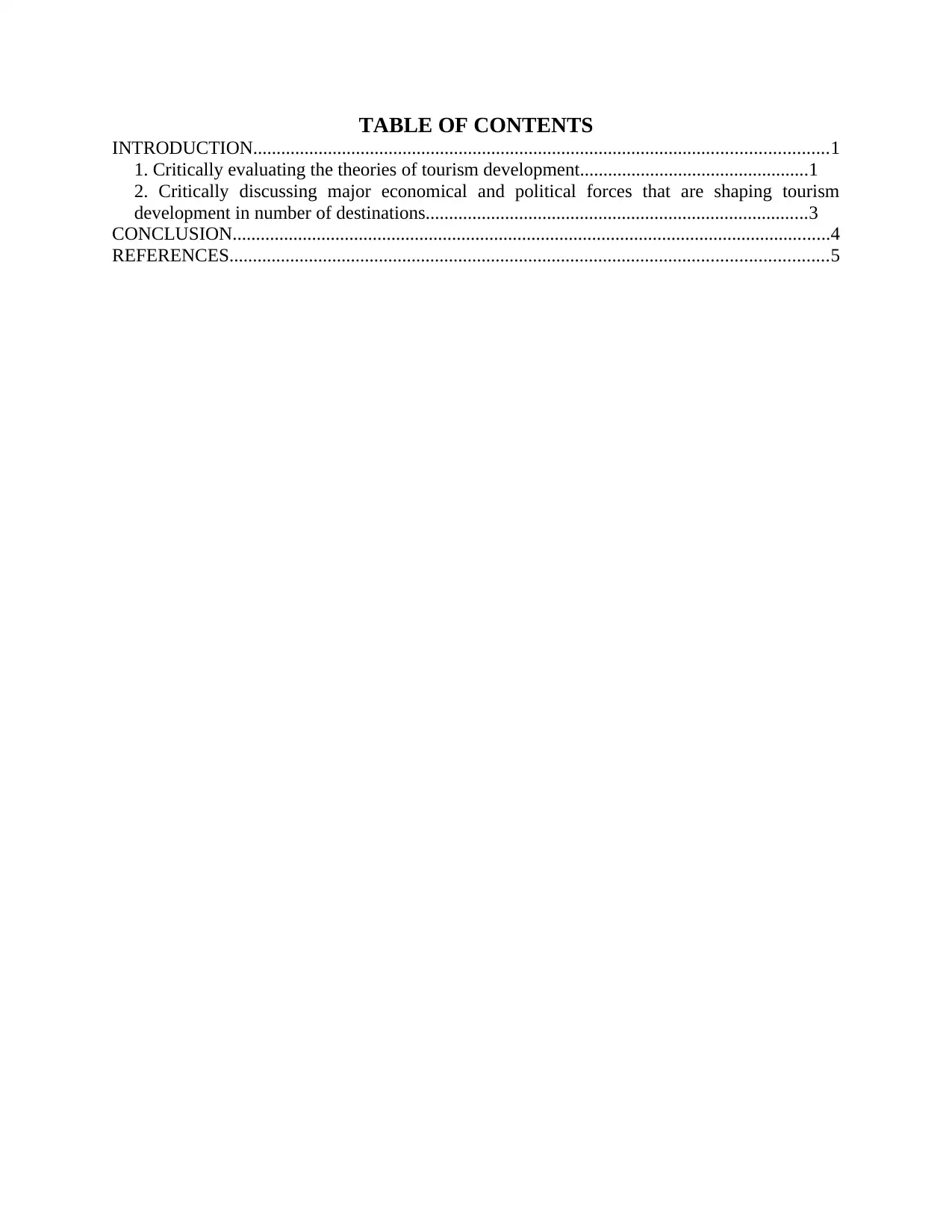
TABLE OF CONTENTS
INTRODUCTION...........................................................................................................................1
1. Critically evaluating the theories of tourism development.................................................1
2. Critically discussing major economical and political forces that are shaping tourism
development in number of destinations..................................................................................3
CONCLUSION................................................................................................................................4
REFERENCES................................................................................................................................5
INTRODUCTION...........................................................................................................................1
1. Critically evaluating the theories of tourism development.................................................1
2. Critically discussing major economical and political forces that are shaping tourism
development in number of destinations..................................................................................3
CONCLUSION................................................................................................................................4
REFERENCES................................................................................................................................5
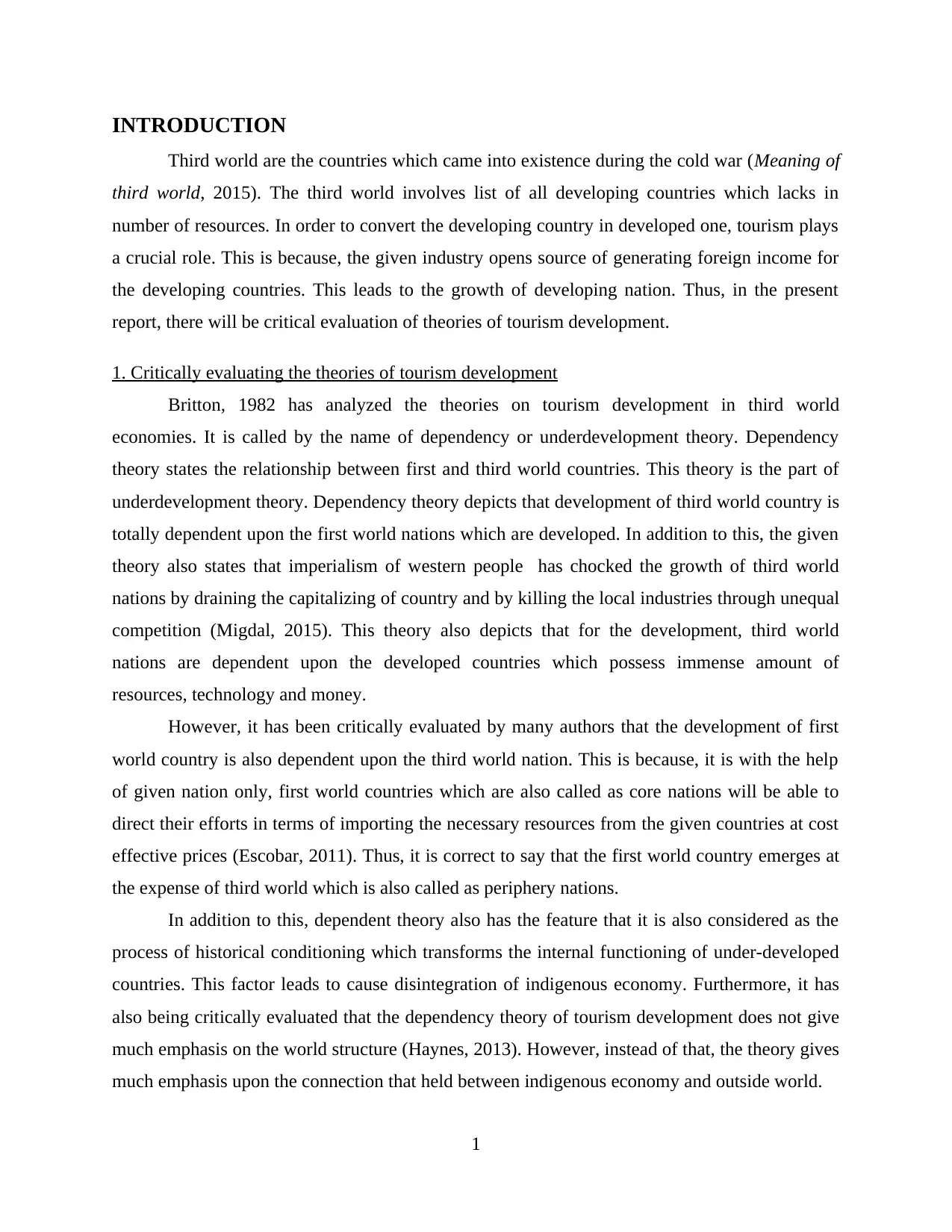
INTRODUCTION
Third world are the countries which came into existence during the cold war (Meaning of
third world, 2015). The third world involves list of all developing countries which lacks in
number of resources. In order to convert the developing country in developed one, tourism plays
a crucial role. This is because, the given industry opens source of generating foreign income for
the developing countries. This leads to the growth of developing nation. Thus, in the present
report, there will be critical evaluation of theories of tourism development.
1. Critically evaluating the theories of tourism development
Britton, 1982 has analyzed the theories on tourism development in third world
economies. It is called by the name of dependency or underdevelopment theory. Dependency
theory states the relationship between first and third world countries. This theory is the part of
underdevelopment theory. Dependency theory depicts that development of third world country is
totally dependent upon the first world nations which are developed. In addition to this, the given
theory also states that imperialism of western people has chocked the growth of third world
nations by draining the capitalizing of country and by killing the local industries through unequal
competition (Migdal, 2015). This theory also depicts that for the development, third world
nations are dependent upon the developed countries which possess immense amount of
resources, technology and money.
However, it has been critically evaluated by many authors that the development of first
world country is also dependent upon the third world nation. This is because, it is with the help
of given nation only, first world countries which are also called as core nations will be able to
direct their efforts in terms of importing the necessary resources from the given countries at cost
effective prices (Escobar, 2011). Thus, it is correct to say that the first world country emerges at
the expense of third world which is also called as periphery nations.
In addition to this, dependent theory also has the feature that it is also considered as the
process of historical conditioning which transforms the internal functioning of under-developed
countries. This factor leads to cause disintegration of indigenous economy. Furthermore, it has
also being critically evaluated that the dependency theory of tourism development does not give
much emphasis on the world structure (Haynes, 2013). However, instead of that, the theory gives
much emphasis upon the connection that held between indigenous economy and outside world.
1
Third world are the countries which came into existence during the cold war (Meaning of
third world, 2015). The third world involves list of all developing countries which lacks in
number of resources. In order to convert the developing country in developed one, tourism plays
a crucial role. This is because, the given industry opens source of generating foreign income for
the developing countries. This leads to the growth of developing nation. Thus, in the present
report, there will be critical evaluation of theories of tourism development.
1. Critically evaluating the theories of tourism development
Britton, 1982 has analyzed the theories on tourism development in third world
economies. It is called by the name of dependency or underdevelopment theory. Dependency
theory states the relationship between first and third world countries. This theory is the part of
underdevelopment theory. Dependency theory depicts that development of third world country is
totally dependent upon the first world nations which are developed. In addition to this, the given
theory also states that imperialism of western people has chocked the growth of third world
nations by draining the capitalizing of country and by killing the local industries through unequal
competition (Migdal, 2015). This theory also depicts that for the development, third world
nations are dependent upon the developed countries which possess immense amount of
resources, technology and money.
However, it has been critically evaluated by many authors that the development of first
world country is also dependent upon the third world nation. This is because, it is with the help
of given nation only, first world countries which are also called as core nations will be able to
direct their efforts in terms of importing the necessary resources from the given countries at cost
effective prices (Escobar, 2011). Thus, it is correct to say that the first world country emerges at
the expense of third world which is also called as periphery nations.
In addition to this, dependent theory also has the feature that it is also considered as the
process of historical conditioning which transforms the internal functioning of under-developed
countries. This factor leads to cause disintegration of indigenous economy. Furthermore, it has
also being critically evaluated that the dependency theory of tourism development does not give
much emphasis on the world structure (Haynes, 2013). However, instead of that, the theory gives
much emphasis upon the connection that held between indigenous economy and outside world.
1
⊘ This is a preview!⊘
Do you want full access?
Subscribe today to unlock all pages.

Trusted by 1+ million students worldwide
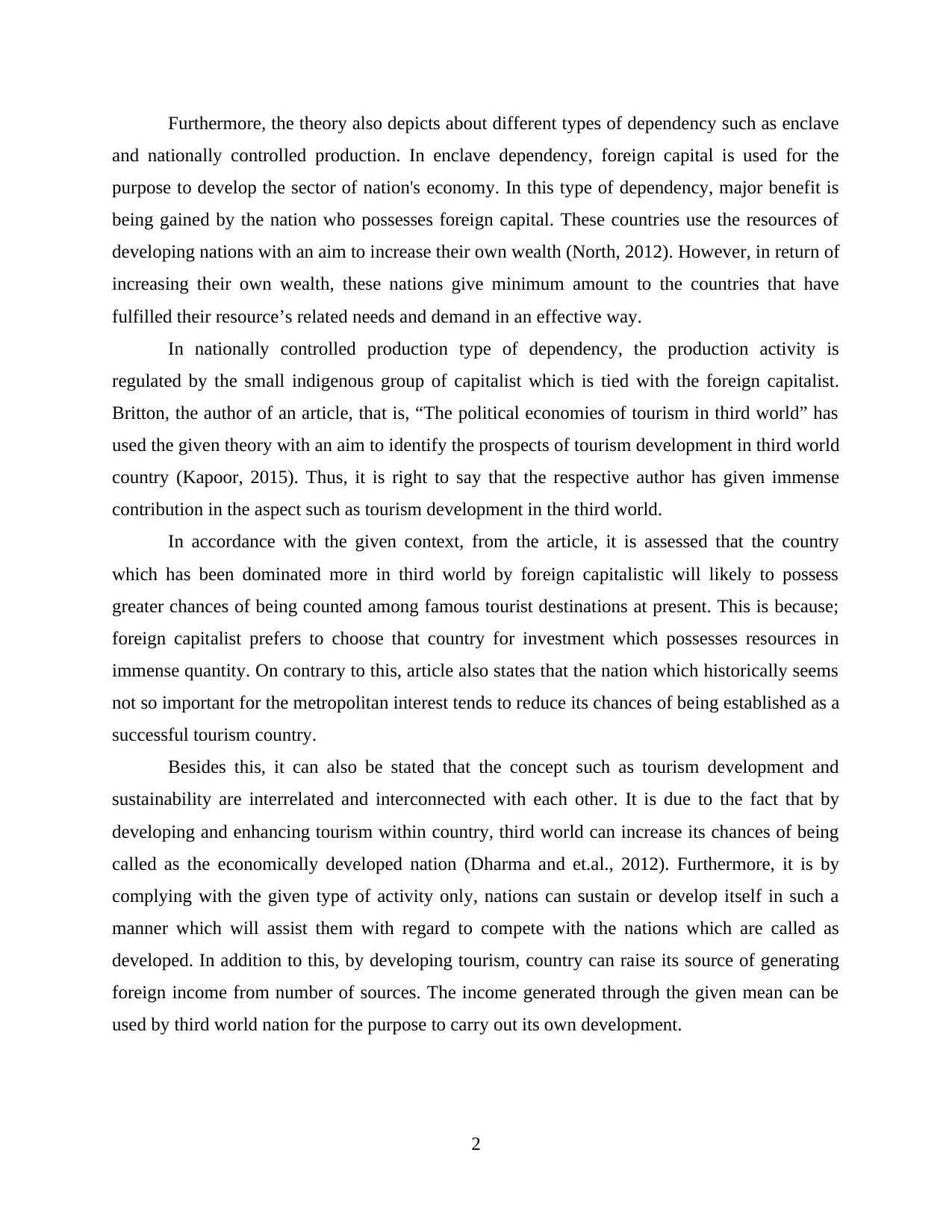
Furthermore, the theory also depicts about different types of dependency such as enclave
and nationally controlled production. In enclave dependency, foreign capital is used for the
purpose to develop the sector of nation's economy. In this type of dependency, major benefit is
being gained by the nation who possesses foreign capital. These countries use the resources of
developing nations with an aim to increase their own wealth (North, 2012). However, in return of
increasing their own wealth, these nations give minimum amount to the countries that have
fulfilled their resource’s related needs and demand in an effective way.
In nationally controlled production type of dependency, the production activity is
regulated by the small indigenous group of capitalist which is tied with the foreign capitalist.
Britton, the author of an article, that is, “The political economies of tourism in third world” has
used the given theory with an aim to identify the prospects of tourism development in third world
country (Kapoor, 2015). Thus, it is right to say that the respective author has given immense
contribution in the aspect such as tourism development in the third world.
In accordance with the given context, from the article, it is assessed that the country
which has been dominated more in third world by foreign capitalistic will likely to possess
greater chances of being counted among famous tourist destinations at present. This is because;
foreign capitalist prefers to choose that country for investment which possesses resources in
immense quantity. On contrary to this, article also states that the nation which historically seems
not so important for the metropolitan interest tends to reduce its chances of being established as a
successful tourism country.
Besides this, it can also be stated that the concept such as tourism development and
sustainability are interrelated and interconnected with each other. It is due to the fact that by
developing and enhancing tourism within country, third world can increase its chances of being
called as the economically developed nation (Dharma and et.al., 2012). Furthermore, it is by
complying with the given type of activity only, nations can sustain or develop itself in such a
manner which will assist them with regard to compete with the nations which are called as
developed. In addition to this, by developing tourism, country can raise its source of generating
foreign income from number of sources. The income generated through the given mean can be
used by third world nation for the purpose to carry out its own development.
2
and nationally controlled production. In enclave dependency, foreign capital is used for the
purpose to develop the sector of nation's economy. In this type of dependency, major benefit is
being gained by the nation who possesses foreign capital. These countries use the resources of
developing nations with an aim to increase their own wealth (North, 2012). However, in return of
increasing their own wealth, these nations give minimum amount to the countries that have
fulfilled their resource’s related needs and demand in an effective way.
In nationally controlled production type of dependency, the production activity is
regulated by the small indigenous group of capitalist which is tied with the foreign capitalist.
Britton, the author of an article, that is, “The political economies of tourism in third world” has
used the given theory with an aim to identify the prospects of tourism development in third world
country (Kapoor, 2015). Thus, it is right to say that the respective author has given immense
contribution in the aspect such as tourism development in the third world.
In accordance with the given context, from the article, it is assessed that the country
which has been dominated more in third world by foreign capitalistic will likely to possess
greater chances of being counted among famous tourist destinations at present. This is because;
foreign capitalist prefers to choose that country for investment which possesses resources in
immense quantity. On contrary to this, article also states that the nation which historically seems
not so important for the metropolitan interest tends to reduce its chances of being established as a
successful tourism country.
Besides this, it can also be stated that the concept such as tourism development and
sustainability are interrelated and interconnected with each other. It is due to the fact that by
developing and enhancing tourism within country, third world can increase its chances of being
called as the economically developed nation (Dharma and et.al., 2012). Furthermore, it is by
complying with the given type of activity only, nations can sustain or develop itself in such a
manner which will assist them with regard to compete with the nations which are called as
developed. In addition to this, by developing tourism, country can raise its source of generating
foreign income from number of sources. The income generated through the given mean can be
used by third world nation for the purpose to carry out its own development.
2
Paraphrase This Document
Need a fresh take? Get an instant paraphrase of this document with our AI Paraphraser
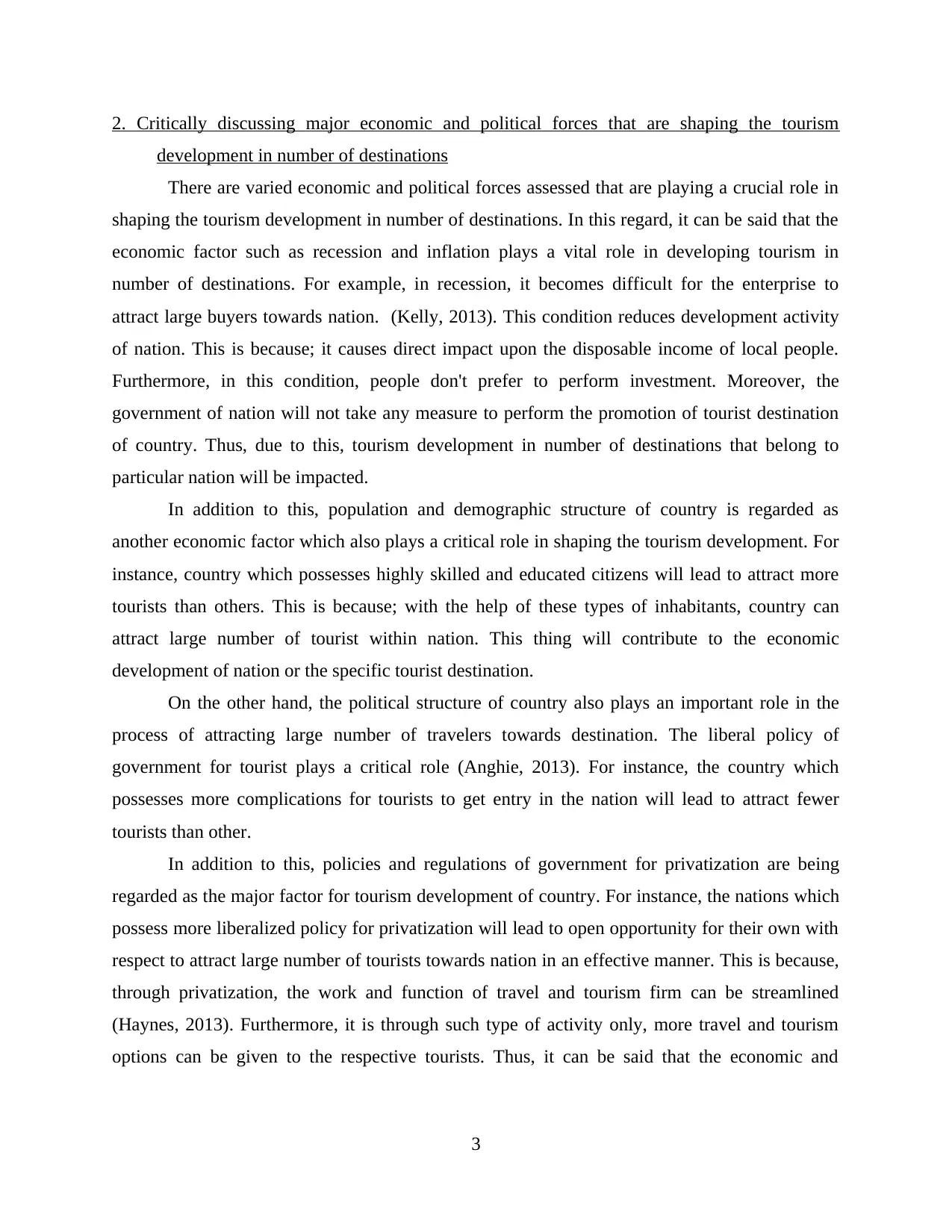
2. Critically discussing major economic and political forces that are shaping the tourism
development in number of destinations
There are varied economic and political forces assessed that are playing a crucial role in
shaping the tourism development in number of destinations. In this regard, it can be said that the
economic factor such as recession and inflation plays a vital role in developing tourism in
number of destinations. For example, in recession, it becomes difficult for the enterprise to
attract large buyers towards nation. (Kelly, 2013). This condition reduces development activity
of nation. This is because; it causes direct impact upon the disposable income of local people.
Furthermore, in this condition, people don't prefer to perform investment. Moreover, the
government of nation will not take any measure to perform the promotion of tourist destination
of country. Thus, due to this, tourism development in number of destinations that belong to
particular nation will be impacted.
In addition to this, population and demographic structure of country is regarded as
another economic factor which also plays a critical role in shaping the tourism development. For
instance, country which possesses highly skilled and educated citizens will lead to attract more
tourists than others. This is because; with the help of these types of inhabitants, country can
attract large number of tourist within nation. This thing will contribute to the economic
development of nation or the specific tourist destination.
On the other hand, the political structure of country also plays an important role in the
process of attracting large number of travelers towards destination. The liberal policy of
government for tourist plays a critical role (Anghie, 2013). For instance, the country which
possesses more complications for tourists to get entry in the nation will lead to attract fewer
tourists than other.
In addition to this, policies and regulations of government for privatization are being
regarded as the major factor for tourism development of country. For instance, the nations which
possess more liberalized policy for privatization will lead to open opportunity for their own with
respect to attract large number of tourists towards nation in an effective manner. This is because,
through privatization, the work and function of travel and tourism firm can be streamlined
(Haynes, 2013). Furthermore, it is through such type of activity only, more travel and tourism
options can be given to the respective tourists. Thus, it can be said that the economic and
3
development in number of destinations
There are varied economic and political forces assessed that are playing a crucial role in
shaping the tourism development in number of destinations. In this regard, it can be said that the
economic factor such as recession and inflation plays a vital role in developing tourism in
number of destinations. For example, in recession, it becomes difficult for the enterprise to
attract large buyers towards nation. (Kelly, 2013). This condition reduces development activity
of nation. This is because; it causes direct impact upon the disposable income of local people.
Furthermore, in this condition, people don't prefer to perform investment. Moreover, the
government of nation will not take any measure to perform the promotion of tourist destination
of country. Thus, due to this, tourism development in number of destinations that belong to
particular nation will be impacted.
In addition to this, population and demographic structure of country is regarded as
another economic factor which also plays a critical role in shaping the tourism development. For
instance, country which possesses highly skilled and educated citizens will lead to attract more
tourists than others. This is because; with the help of these types of inhabitants, country can
attract large number of tourist within nation. This thing will contribute to the economic
development of nation or the specific tourist destination.
On the other hand, the political structure of country also plays an important role in the
process of attracting large number of travelers towards destination. The liberal policy of
government for tourist plays a critical role (Anghie, 2013). For instance, the country which
possesses more complications for tourists to get entry in the nation will lead to attract fewer
tourists than other.
In addition to this, policies and regulations of government for privatization are being
regarded as the major factor for tourism development of country. For instance, the nations which
possess more liberalized policy for privatization will lead to open opportunity for their own with
respect to attract large number of tourists towards nation in an effective manner. This is because,
through privatization, the work and function of travel and tourism firm can be streamlined
(Haynes, 2013). Furthermore, it is through such type of activity only, more travel and tourism
options can be given to the respective tourists. Thus, it can be said that the economic and
3
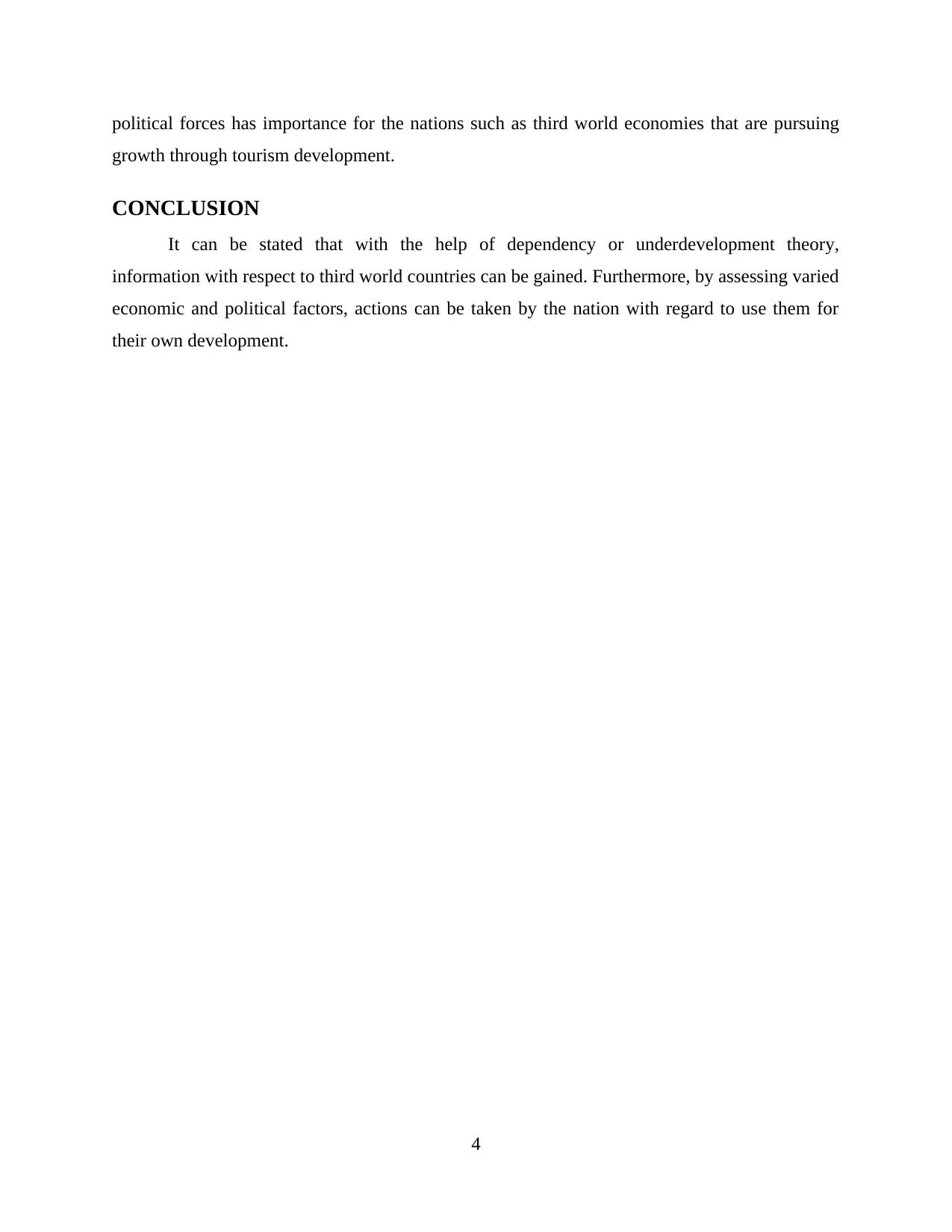
political forces has importance for the nations such as third world economies that are pursuing
growth through tourism development.
CONCLUSION
It can be stated that with the help of dependency or underdevelopment theory,
information with respect to third world countries can be gained. Furthermore, by assessing varied
economic and political factors, actions can be taken by the nation with regard to use them for
their own development.
4
growth through tourism development.
CONCLUSION
It can be stated that with the help of dependency or underdevelopment theory,
information with respect to third world countries can be gained. Furthermore, by assessing varied
economic and political factors, actions can be taken by the nation with regard to use them for
their own development.
4
⊘ This is a preview!⊘
Do you want full access?
Subscribe today to unlock all pages.

Trusted by 1+ million students worldwide
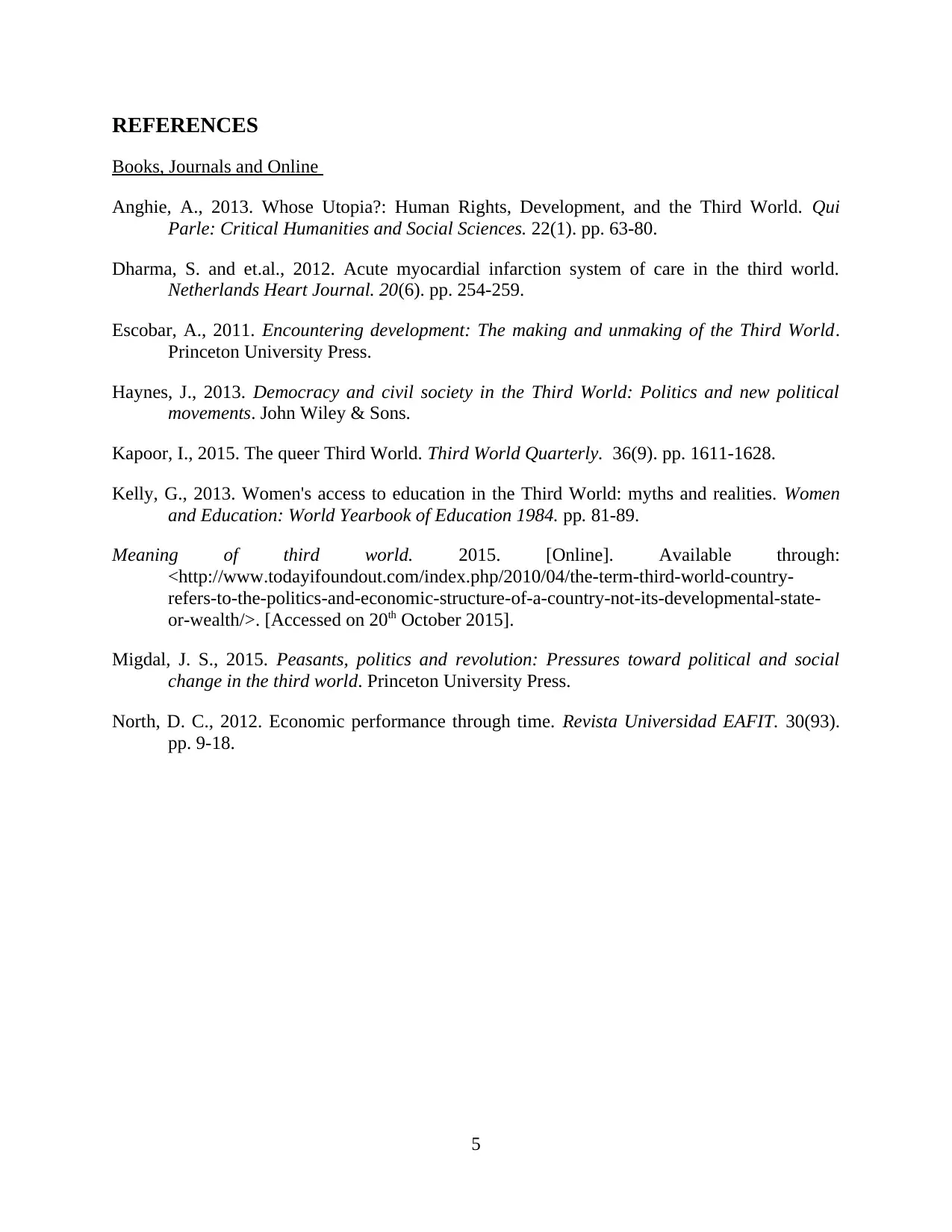
REFERENCES
Books, Journals and Online
Anghie, A., 2013. Whose Utopia?: Human Rights, Development, and the Third World. Qui
Parle: Critical Humanities and Social Sciences. 22(1). pp. 63-80.
Dharma, S. and et.al., 2012. Acute myocardial infarction system of care in the third world.
Netherlands Heart Journal. 20(6). pp. 254-259.
Escobar, A., 2011. Encountering development: The making and unmaking of the Third World.
Princeton University Press.
Haynes, J., 2013. Democracy and civil society in the Third World: Politics and new political
movements. John Wiley & Sons.
Kapoor, I., 2015. The queer Third World. Third World Quarterly. 36(9). pp. 1611-1628.
Kelly, G., 2013. Women's access to education in the Third World: myths and realities. Women
and Education: World Yearbook of Education 1984. pp. 81-89.
Meaning of third world. 2015. [Online]. Available through:
<http://www.todayifoundout.com/index.php/2010/04/the-term-third-world-country-
refers-to-the-politics-and-economic-structure-of-a-country-not-its-developmental-state-
or-wealth/>. [Accessed on 20th October 2015].
Migdal, J. S., 2015. Peasants, politics and revolution: Pressures toward political and social
change in the third world. Princeton University Press.
North, D. C., 2012. Economic performance through time. Revista Universidad EAFIT. 30(93).
pp. 9-18.
5
Books, Journals and Online
Anghie, A., 2013. Whose Utopia?: Human Rights, Development, and the Third World. Qui
Parle: Critical Humanities and Social Sciences. 22(1). pp. 63-80.
Dharma, S. and et.al., 2012. Acute myocardial infarction system of care in the third world.
Netherlands Heart Journal. 20(6). pp. 254-259.
Escobar, A., 2011. Encountering development: The making and unmaking of the Third World.
Princeton University Press.
Haynes, J., 2013. Democracy and civil society in the Third World: Politics and new political
movements. John Wiley & Sons.
Kapoor, I., 2015. The queer Third World. Third World Quarterly. 36(9). pp. 1611-1628.
Kelly, G., 2013. Women's access to education in the Third World: myths and realities. Women
and Education: World Yearbook of Education 1984. pp. 81-89.
Meaning of third world. 2015. [Online]. Available through:
<http://www.todayifoundout.com/index.php/2010/04/the-term-third-world-country-
refers-to-the-politics-and-economic-structure-of-a-country-not-its-developmental-state-
or-wealth/>. [Accessed on 20th October 2015].
Migdal, J. S., 2015. Peasants, politics and revolution: Pressures toward political and social
change in the third world. Princeton University Press.
North, D. C., 2012. Economic performance through time. Revista Universidad EAFIT. 30(93).
pp. 9-18.
5
1 out of 7
Related Documents
Your All-in-One AI-Powered Toolkit for Academic Success.
+13062052269
info@desklib.com
Available 24*7 on WhatsApp / Email
![[object Object]](/_next/static/media/star-bottom.7253800d.svg)
Unlock your academic potential
Copyright © 2020–2025 A2Z Services. All Rights Reserved. Developed and managed by ZUCOL.





